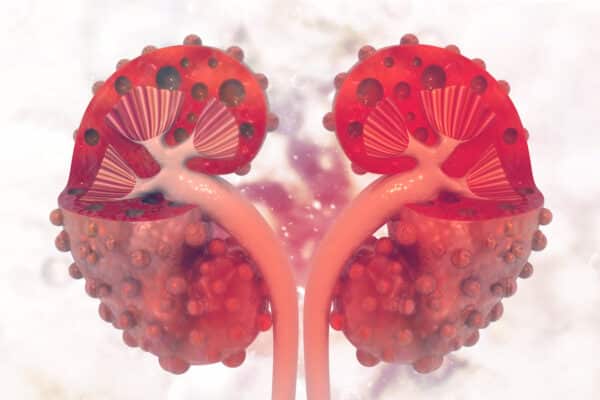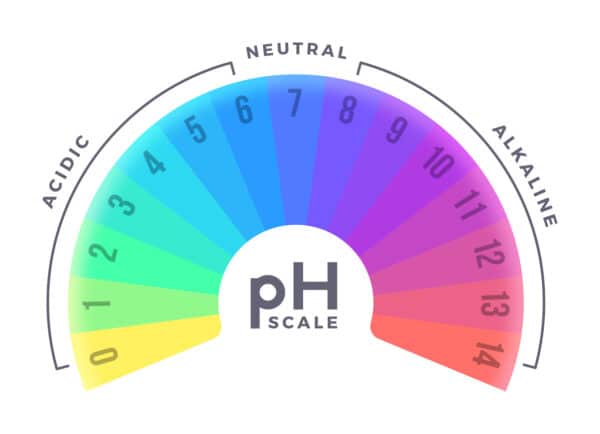
The Protective Role of Turmeric in Disease

Most people have heard that turmeric can lower inflammation and is useful for arthritis, but does it have any benefits when it comes to kidney disease? Short answer = yes, read on to find out how.
Turmeric is a highly powerful herb with a number of amazing health and healing properties. This ancient spice, celebrated for centuries as both food and medicine has shown therapeutic potential against a wide range of diseases.
What is Turmeric?

Turmeric comes from the root of Curcuma longa, a flowering plant of the ginger family. It’s often sold in spice jars, however, if bought fresh, it looks similar to ginger root with a more intense yellow to golden colour.
Turmeric contains many plant substances, but one group, the curcuminoids, has the greatest health-promoting effects. Three notable curcuminoids are curcumin, demethoxycurcumin and bisdemethoxycurcumin. Of these, curcumin is the most active and most beneficial to health.
Actions of Curcumin
- Anti-inflammatory
- Antioxidant
- Lowers blood sugar
- Anti-cancer
- Protects the liver
- Protects the heart
- Protects the kidneys
- Anti-arthritis
- Cholesterol lowering
- Anti-asthmatic
- Antiplatelet
- Antibacterial
As you can see, curcumin has a number of different actions which account for its numerous health benefits and if I was to talk about them all, this would be a very long article indeed, so instead I wanted to focus on the benefits of curcumin when it comes to kidney disease.
Anti-inflammatory and Antioxidant Actions

https://www.sciencedirect.com/science/article/pii/S2213231713000670
Curcumin is probably best known for its anti-inflammatory and antioxidant actions and most of its health benefits stem from this.
Inflammation and oxidative stress play a significant role in nearly every chronic disease there is, including kidney disease. When you have chronic inflammation, your body’s inflammatory response can eventually start damaging healthy cells, tissues and organs.
Let’s have a look at what this looks like for the kidneys.
When inflammation is present in the body, the immune system then comes in to try to repair it. Unfortunately, particularly in states of chronic inflammation, this ends up doing more harm than good and contributes to more inflammation and damage.
Inflammation and inflammatory reactions can change or interfere with blood flow within the kidneys and can cause kidney damage which can enhance CKD progression. Systemic or intrarenal inflammation also contributes to the production of reactive oxygen species that contribute to damage to kidney tubules and nephron death.
If something isn’t done to block the inflammation or deal with the free radicals, you can see how this can become a vicious cycle of continued damage.
It is well established that curcumin is a strong anti-inflammatory and numerous studies have shown that it inhibits certain inflammatory pathways that play important roles in the development of inflammation in kidney disease.
One of these inflammatory molecules is transforming growth factor beta (TGF-B) which is involved in the development of renal fibrosis and kidney scarring. Renal fibrosis is the main process that underlies the progression of CKD to end stage renal disease (ESRD).
By reducing inflammation, oxidative stress and the actions of inflammatory molecules like TGF-B, curcumin has been shown to prevent the occurrence of kidney fibrosis and scarring which means it may be able to slow or halt the progression of kidney disease.
Protection of the kidneys

https://www.sciencedirect.com/science/article/abs/pii/S1756464617307387
Through its anti-inflammatory and antioxidant actions, curcumin can protect the kidneys from damage. People with CKD are at an increased risk of acute kidney injury (AKI) which might occur with the use of certain drugs. AKI can cause further damage to the kidneys and increase the risk of progression of CKD.
Animal studies have shown that curcumin can protect against AKI. It has been shown to protect against drugs well known to cause kidney damage including gentamicin, adriamycin, cisplatin, cyclosporin and chloroquine and also protects against kidney damage from heavy metal exposure.
Diabetes

https://www.mdpi.com/2072-6643/12/1/58/htm
Turmeric has been used as a treatment for diabetes in Ayurvedic and Traditional Chinese medicine for thousands of years. More recently, curcumin has caught scientific attention as a potential therapeutic agent in diabetes and for the treatment of complications of diabetes.
In clinical studies, curcumin lowers blood sugar levels, reduces HbA1c, improves insulin resistance and has a positive effect on weight loss but that’s not all it does, it has also been shown to protect against diabetic kidney disease.
Oxidative stress related to high blood sugars can cause kidney cell dysfunction and damage and curcumin as an antioxidant and anti-inflammatory reduces this damage. Studies with animals and humans with diabetes have shown that curcumin significantly decreases protein loss in urine, lowers urea, uric acid and creatinine and protects against scarring of the kidneys.
Cardiovascular disease
Curcumin also has multiple benefits when it comes to the treatment and prevention of cardiovascular disease which is a well-known problem for people with kidney disease.
It can lower blood pressure, lower cholesterol levels and is known to decrease atherosclerosis which is a disease where plaque builds up in the arteries causing them to become narrower and reducing the amount of oxygen and nutrients travelling throughout the body and to the brain, heart and kidneys and increases the risk of having a heart attack or stroke.
Curcumin has also been shown to reduce heart failure by reducing cardiomyopathy (enlargement of the heart) and endothelial dysfunction where the blood vessels of the heart become narrower and don’t dilate or open properly. Heart failure can both increase the risk of developing kidney disease and be a consequence of kidney disease.
Renal transplant
Curcumin has also been studied in patients who have had a kidney transplant. Delayed graft function is something that affects approximately 30% of deceased-donor kidneys and 5% of living-related donor kidneys and occurs when the new kidney isn’t working as it should and patients need dialysis for a period of time.
Curcumin and quercetin (a plant flavonoid) have been shown to reduce the occurrence of delayed graft function and when given to people with delayed graft function it improved their urine output and lowered their creatinine levels, indicating improved functioning of their new kidney.
Curcumin and quercetin also resolved symptoms of neurotoxicity (tremor, insomnia and restlessness) which is a common and often distressing problem associated with the anti-rejection medications cyclosporine and tacrolimus.
In one study, all 7 patients who were experiencing neurotoxicity had complete resolution of their symptoms whilst taking curcumin and quercetin, when the supplements were stopped the symptoms returned but quickly resolved again after going back on curcumin and quercetin.
Lupus Nephritis
Lupus nephritis is inflammation of the kidneys that is caused by the autoimmune condition lupus. In a clinical trial, patients with lupus who were given curcumin for 3 months had a significant decrease in protein loss in urine, blood pressure and blood in urine compared to those given a placebo.
Persistent proteinuria results in more kidney inflammation, fibrosis, nephron damage and deterioration of kidney function so reducing proteinuria results in less damage to the kidneys and slows or prevents further deterioration of kidney function.
Pain relief
Curcumin is a great alternative to pain relief medication. The anti-inflammatory and pain-relieving effect of curcumin is comparable to non-steroidal anti-inflammatory drugs (NSAIDs) which is great news given the fact that NSAIDs are well known to cause AKI and should be avoided where possible in people with kidney disease.
Bioavailability
One of the issues with curcumin is that by itself it is poorly absorbed so to address this issue it is often combined with piperine (a black pepper extract) or lipids (fats) or formulated in a specific way to ensure it can be absorbed and used by the body. For this reason, make sure you purchase a good quality curcumin supplement from a reputable company.
Therapeutic dose
The therapeutic dose of curcumin is 500mg-1500mg a day. It is best taken in divided doses throughout the day with meals.
Cautions and Contraindications
Theoretically, curcumin might increase the effects of anticoagulants and antiplatelet drugs like warfarin, apixaban and pradaxa, possibly increasing the risk of bleeding so it may need to be avoided alongside these medications.
Because curcumin can lower blood glucose levels and blood pressure, it may have an additive effect alongside blood pressure or diabetic medication so closer monitoring of blood pressure and blood sugar is needed.
Don’t forget
Before starting on any new supplements, make sure you discuss this with your doctor or naturopath first to ensure they are appropriate for you.
So there it is, a review of just some of the actions and benefits of curcumin and the role it can play in protecting the kidneys and helping with diabetes and cardiovascular disease. Hopefully you’ve found this information useful. If so, please let us know by sharing it with your family and friends.
Share This Article
LIKE WHAT YOU’VE READ?
Sign up for free updates delivered to your inbox. Join our community and get tips on health, wellness, nutrition, and more.
More From Our Blog

The Oral Microbiome & Chronic Kidney Disease
The oral microbiome plays an essential role in the incidence and development of

Natural Therapies In The Treatment of Polycystic Kidney Disease
Regarding dietary interventions in treating and managing PKD, the science is solid. The

What Causes Cyst Formation In Polycystic Kidney Disease?
What is polycystic kidney disease? Polycystic kidney disease (PKD) is a prevalent genetic

Bicarbonate Supplements? Is It The Best Way To Alkalize in Kidney Disease?
Throughout the ages, human diets have undergone a significant transformation, shifting from an

The Big Question… Can Kidney Disease Be Reversed?
Kidney disease can range from mild to severe, so the potential for reversal

SS-31 Peptide and Kidney Disease
Kidney disease is a global health concern. The kidneys, especially the proximal tubules,






